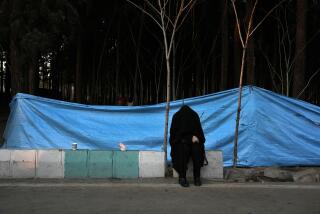Police Seek Clues in New Delhi Debris
- Share via
NEW DELHI — As the death toll climbed to 59, investigators combed through piles of rubble Sunday for clues to the identities and methods of those responsible for bombings that rocked the Indian capital during preparations for a major Hindu holiday.
Jittery customers trickled back to busy shopping districts hit by the blasts. Police heightened security throughout the city and scurried to respond to several reports of suspicious packages, including one at a school for the blind. None turned out to be a threat.
Home Secretary Shivraj Patil said that investigators had gathered “lots of information” about Saturday’s three bombings, which struck two crowded markets and a public bus within half an hour. In addition to the 59 killed, 210 people were injured.
Patil declined to describe the nature of the leads or to name possible suspects, but attention increasingly focused on the Islamic militant group Lashkar-e-Taiba, based in the contested region of Kashmir. A small, lesser-known separatist group called Inqilabi, or Revolution, telephoned a Kashmiri news service to claim responsibility for the explosions.
Police characterized the latter group as a small outfit in existence since 1996 but not very active of late. There was immediate speculation that the group was linked to, or a front for, Lashkar-e-Taiba.
Analysts say that Lashkar-e-Taiba, or Army of the Pure, is one of the few militant groups operating in India that would have been capable of organizing a precisely timed, large-scale attack. The group was implicated in the last major terrorist strike on New Delhi, an assault on Parliament in 2001 that nearly sparked a fourth war between India and longtime rival and fellow nuclear power Pakistan.
The two nations have since engaged in a slow-moving peace process. The most recent sign of progress was Sunday’s announcement of an agreement to open several crossing points in Kashmir for families and relief groups struggling to deal with the aftermath of the Himalayan region’s devastating Oct. 8 earthquake.
Analysts said the bombers might have been aiming to disrupt the peace process. Kashmiri armed groups might also have wanted to dispel widespread reports that their membership and operations had been severely crippled by the quake.
“It becomes incumbent upon them to prove their capabilities,” said Ajai Sahni, executive director of the Institute for Conflict Management in New Delhi. “It’s part of the effort to keep Kashmir up in the headlines and to keep applying pressure on India wherever possible.”
The attacks came during one of the busiest shopping periods of the year, just before Diwali, the Hindu festival of lights. Shoppers are out buying dried fruit, jewelry and other gifts to mark the holiday. Later this week, Muslims will celebrate Eid al-Fitr, the end of Ramadan.
Most merchants in Paharganj and Sarojini Nagar, the market areas targeted in the bombings, opened for business as usual Sunday.
In Paharganj, in the heart of the city, fewer shoppers than expected at this time of year strolled the street, almost equaled in number, it seemed, by those who came to view the cleanup operations at the bomb site. A few cows wandered on the lane.
Police officers wielding stout bamboo poles were thick on the ground, stopping to question taxi drivers or anyone else who appeared to be lingering.
“It is very risky to open, but ... it is festival time. We have to open the shop. It is a must,” said Mukesh Kumar, 50, whose family has sold gold and silver trinkets in the market for half a century.
The windows of his store, which look out on the spot where the first of the three bombs went off early Saturday evening, were blown out. His brother and sister-in-law, who were minding the shop at the time, escaped injury.
Next door, R.K. Chawla, 40, proprietor of the Jack & Jill Overseas crafts shop, vowed to stay on in Paharganj, out of both defiance and resignation to the uncertainties of life in an age of terrorism.
“If I leave this market, I go to another market, and a blast could happen there,” Chawla said. “Terrorism is not only in Delhi, in India. It’s all over the world.”
Shoppers echoed those sentiments. Foreign visitors have turned Paharganj into a popular destination for budget travelers.
“Lightning doesn’t strike the same place twice,” said Golan Kormian, 35, a tourist from Israel. “There’s a higher chance to die here from a car accident or disease or a virus in your body because you ate something spoiled.”
Authorities said that at least a dozen people were killed in the Paharganj bombing. The deadliest blast shook Sarojini Nagar, where more than 40 people died, including several children. No deaths were reported in the explosion aboard the bus in the neighborhood of Govindpuri. The bus conductor and driver evacuated passengers after spotting an unattended bag.
Families desperate for information and frustrated with the continued confusion at hospitals where the wounded were taken confronted Prime Minister Manmohan Singh during an official visit Sunday to victims of the three blasts.
“The hospital authorities are doing their very best,” Singh told the angry crowd.
The death toll of 59 made the bombings one of the most lethal terrorist strikes to hit the Indian capital, which underwent a wave of attacks in the 1980s by Sikh militants. Twenty-one years ago today, then-Prime Minister Indira Gandhi was gunned down by two Sikhs who served as her bodyguards.
The most recent attack occurred in May, when bombs ripped through two local cinemas, killing one person. The government blamed Sikh militants, who it said were offended by a movie being shown.
The talk now, though, is only of Muslim militants from Kashmir. Local media said that more than 20 people had been detained for questioning, but police dismissed the report.
More to Read
Sign up for Essential California
The most important California stories and recommendations in your inbox every morning.
You may occasionally receive promotional content from the Los Angeles Times.











